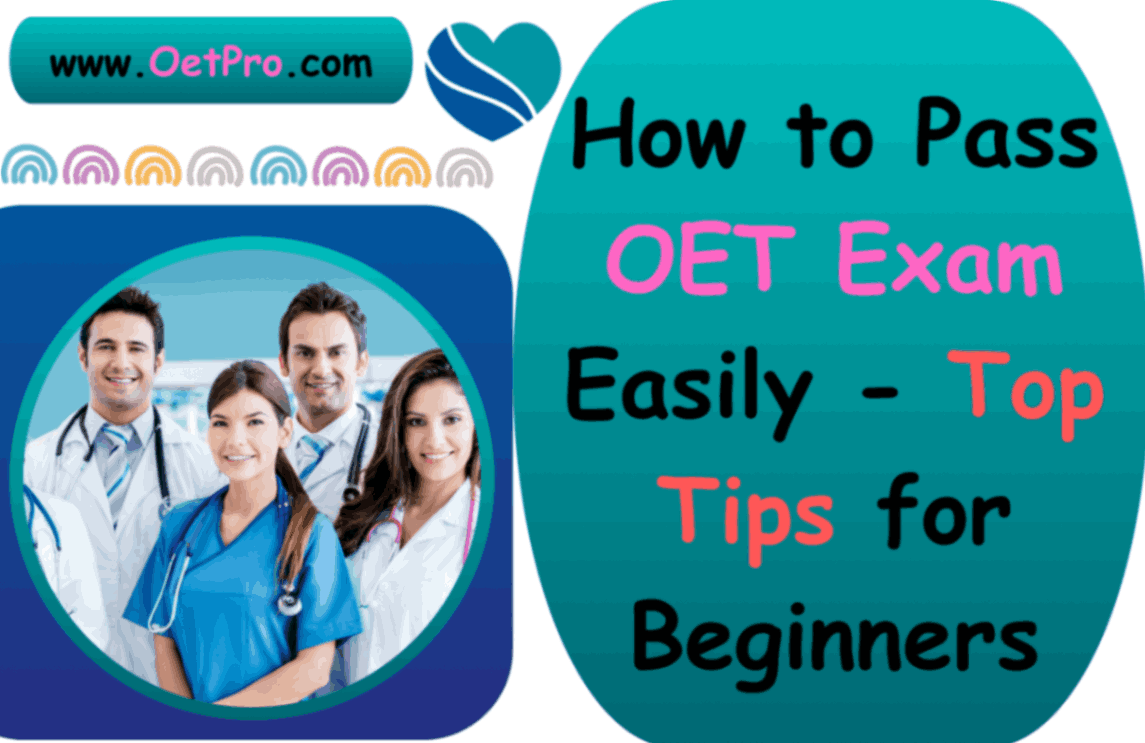
How to Pass OET Exam Easily - Top Tips for Beginners
Are you feeling stressed about the OET test? You’re not alone! Many healthcare professionals struggle with understanding the exam format, meeting expectations, and finding good study resources.
This beginner-friendly guide will make the OET simple for you. You’ll learn clear explanations, easy tips, and powerful study tools so you can take the exam confidently.
The OET is a globally recognised English test for healthcare workers who want to work in English-speaking countries. Whether you're aiming for a job, a license, or a career upgrade, scoring well in the OET is essential.
Even though the OET may feel overwhelming at first, with the right strategy, you can overcome the fear and begin your OET journey successfully.
What Is the OET Exam?
The Occupational English Test (OET) is designed specifically for healthcare professionals. It checks whether candidates can communicate effectively in English in real medical settings.
The exam ensures that healthcare workers have the language skills needed to deliver safe and high-quality patient care.
OET Exam Format
The OET exam is divided into four sub-tests, each assessing a key language skill:
1. Listening
This section checks how well you understand spoken English in healthcare situations.
You will listen to medical conversations, lectures, and consultations and answer multiple-choice questions.
2. Reading
This section tests your ability to understand healthcare-related texts.
You will read patient information leaflets, research articles, and case notes, then answer MCQs, short-answer questions, and fill-in-the-blank tasks.
3. Writing
Here, you need to write professional letters based on case notes.
Common tasks include referral letters, discharge summaries, and transfer letters.
4. Speaking
The speaking section involves healthcare role-plays with an interlocutor.
You'll take patient history, give advice, and handle typical clinical situations.
Types of Questions in the OET
The exam includes various question types such as:
-
Multiple-choice questions
-
Fill-in-the-blank tasks
-
Short-answer questions
-
Note-completion
-
Professional letter writing
-
Role-play interactions
These question formats evaluate how well you communicate in real healthcare scenarios.
Is the OET Easy or Hard?
The difficulty level depends on your English ability, familiarity with the healthcare environment, and how well you prepare.
If you have strong English skills and regular exposure to medical communication, the OET may feel challenging but very manageable.
However, if you struggle with English grammar, vocabulary, or confidence, the test may seem tough.
The good news is with consistent practice and the right resources, you can pass the OET, even on your first attempt.
Where to Begin Your OET Preparation
A highly recommended starting point is www.oetpro.com, which offers excellent OET practice materials — completely FREE.
You’ll find:
-
Sample tests
-
Model answers
-
Practice questions
-
Updated study materials
-
Expert guidance
This platform helps you understand the exam format and practise effectively.
How to Score High in OET – Best Tips for Beginners
1. Understand the Exam Format
Know what each sub-test contains, how long it lasts, and what type of questions to expect.
2. Make a Study Plan
Create a weekly schedule that covers all four sub-tests. Track your progress regularly.
3. Learn Medical Vocabulary
Familiarise yourself with commonly used medical terms, abbreviations, and patient-related language.
4. Practise Regularly
Use sample tests, mock exams, and online exercises to strengthen your skills.
5. Improve Listening Skills
Listen to medical podcasts, lectures, and consultations. Practise identifying key information and following accents.
6. Build Your Reading Skills
Read patient leaflets, research articles, and medical notes. Work on understanding main ideas and important details.
7. Strengthen Your Writing Skills
Practise writing referral letters, summaries, and case notes. Focus on clarity, accuracy, and structure.
8. Work on Speaking Skills
Practise role-plays, patient interactions, and consultations. Aim for clear pronunciation and professional tone.
9. Get Feedback
Ask teachers or experts to check your writing and speaking. Use their corrections to improve.
10. Stay Updated
Keep yourself informed about any changes in the OET format or scoring.
Conclusion
Passing the OET exam is absolutely possible. With the right mindset, consistent practice, and strategic preparation, you can succeed even as a beginner.
Every step from learning the exam pattern to improving your English skills brings you closer to achieving your dream of working abroad.
Stay positive, stay focused, and trust the process. With dedication and the right tools, you’ll be ready to walk into the exam room with confidence.
Wishing you the very best in your OET journey!
Frequently Asked Questions (FAQs)
Q1. What is the OET exam?
The OET is an English test for healthcare workers who want to work or study in English-speaking environments.
Q2. Who can take the OET?
Doctors, nurses, dentists, pharmacists, physiotherapists, and other allied health professionals.
Q3. What are the four parts of the OET?
Listening, Reading, Writing, and Speaking.
Q4. How is the OET scored?
Scores range from A to E, with A being the highest.
Q5. How should I prepare for the OET?
Use practice tests, study medical vocabulary, take preparation courses, and get feedback.
Q6. How long is the OET valid?
OET results are valid for 2 years.
Q7. Can I retake the OET if I fail?
Yes, you can retake it as many times as needed, but some regulatory bodies have retake limits.